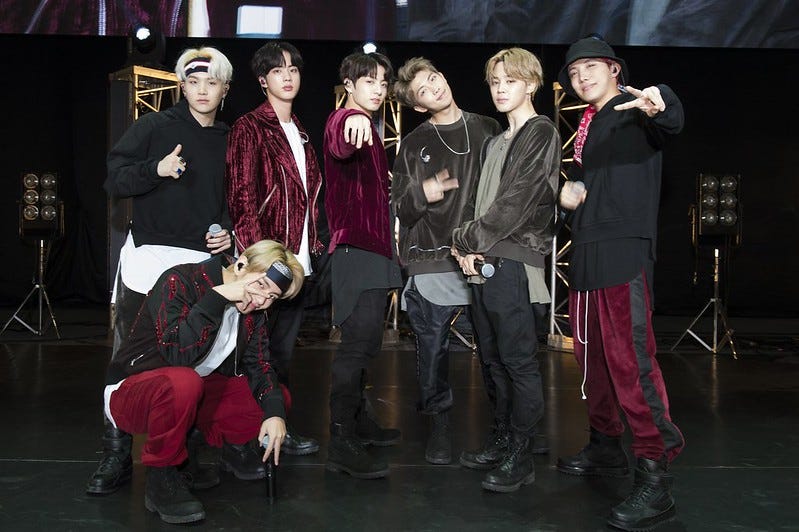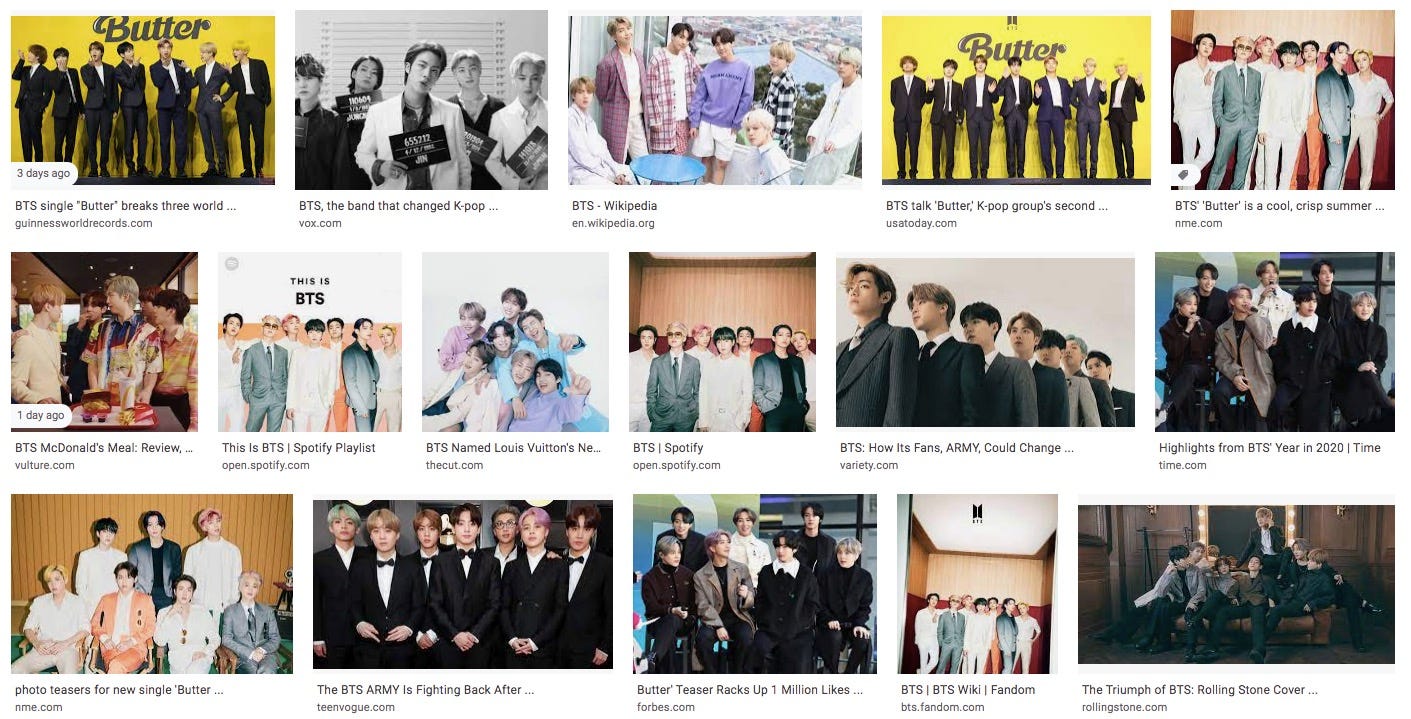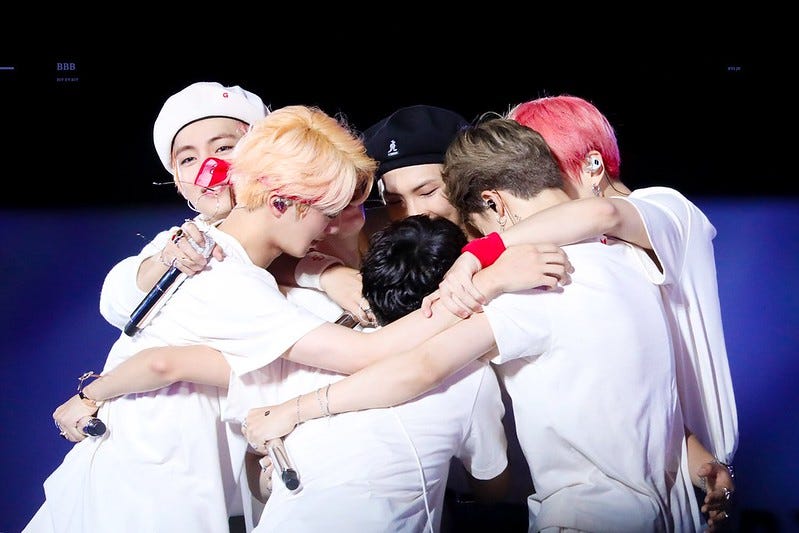What I Learned About Myself, Korea, and the World through BTS Fandom
Are You Ready for Non-English Songs, Fan-based Activism and Lots of PDA?
For those of you who haven’t had the blessing of getting to know BTS yet, they are a South Korean boy band of seven members who debuted in 2013. They are the best-selling artists in South Korean history and were among the 100 most influential people in the world according to Time in 2019. You will also hear them mention 아미 / ARMY. It is used as a proper noun to refer to BTS fans. Actually, their English name BTS is an acronym of their Korean name 방탄소년단, which means bulletproof boy scouts (the members were between the ages of 15 and 20 when they debuted). Since the army as a military unit and armors always go together, fans hope that ARMY will always be there with BTS members.
Photo credit: Yun_Q
Photo credit: Yun_Q
I started following BTS in March when I read about them in a copy of outdated Esquire magazine at my local bakery. Seeing seven Korean faces on its cover pleasantly surprised me and piqued my curiosity. Since then, I’ve learned these eight things about myself and the world through BTS and ARMY.
One. I am (still) prone to screen addiction.
This is the first thing I noticed as I entered the BTS fandom. I recognized it when I was suddenly watching hours of BTS videos on different platforms online. Since their debut, BTS has been uploading tons of online content as per their marketing strategy, which created an ocean of BTS materials to consume. Instead of walking into the fandom, I rather dove into it.
I have experienced a few types of addiction in my life, and what I am struggling with the most in recent years is screen addiction. It comes from my addiction to stimulation, which is caused by my inability to deal with difficult emotions or mental states: loneliness, anxiety, fear, boredom, stress, etc. In order to escape from the overwhelming state, I seek stimulation. In the daily life of working from home, the most accessible stimulation is watching videos on screen.
Two. It is deeply satisfying to watch the members be intimate with one another.
It is not just videos of BTS singing and dancing. There is an even bigger volume of videos of them talking, laughing, playing games, cooking, eating, and traveling. It is common in South Korea for singers to go on game-or-competition-based variety shows or reality shows to promote their new albums or increase their popularity. Through such exposure, fans get to see the singers’ less-curated sides and fall for their unique characteristics. Among their fans, BTS members are famous for how physically close they are. They don’t mind sharing their beds, plates, chopsticks, spoons, and straws. They feed each other and wipe each other’s mouths. Massaging, scratching, holding hands, hugging, carrying, and spanking are a daily part of their relationships. And watching them being happy together brings me a stream of oxytocin that my brain desperately craves.
Photo of members at BTS LYS Tour in Seoul by Yun_Q
Three. Physical contact in platonic relationships is normalized in Korea.
There is a stark difference between how teenagers behave with their friends in South Korea and the United States: Korean kids touch each other a lot more with same-gender friends. The amount of physical contact decreases as they get older, but it is not viewed as weird among close adult friends. It also never leads to the suspicion of being homosexual. I found it quite refreshing to watch grown men being comfortable with their bodies while toxic masculinity and homophobia in the United States do not allow men to express platonic affection for one another.
Four. Being romantic M2M is acceptable as long as you are not openly gay.
Now you might be thinking that Korea is a society open to homosexual relationships. Unfortunately, that is far from true. It is a highly homophobic society with no law protecting people from discrimination based on their sexual orientation. Same-sex marriage is also banned. However, you can find a significant number of fans of girlbands and boybands theorizing and rooting for romantic relationships between two band members, commonly known as shipping. Fans then create analysis videos, fan-fictions, and fan-arts where their ships are romantic/sexual couples. Such a phenomenon is quite ironic to the reality of the Korean music industry, where the tolerance for LGBTQ+ people is so low that there is no singer who is openly gay, trans, or gender-queer.
Five. Having high visibility as a Korean boyband carries more significance when Asian hate is running high in the United States.
On March 29, 2021, BTS released a letter condemning hatred toward Asians in the United States and extending their empathy and consolation to those who are experiencing anti-Asian racism. Their words reach their 35 million Twitter followers. They have an increasing presence in the US music industry as their songs dominate billboard charts and get nominated for awards like the Grammys. As of April 11, 2021, their song ‘Dynamite’ has broken the record of being the top on the Hot 100 Digital Songs chart for 18 weeks, surpassing the previous 17-week record of ‘Despacito’ by Luis Fonsi and Daddy Yankee (ft. Justin Bieber). While Asian Americans are constantly erased in the racial dialogue in the US, seeing Korean musicians on TV screens and hearing their unapologetic voices makes me feel a bit more visible.
Six. BTS and ARMY might be the starting point of cracking the decades-old English dominance in the international music scene.
When I was attending middle school and high school in South Korea, my classmates and I often used pop songs to study English. I remember copying the lyrics of ‘Yesterday’ by The Beatles and “I’ll Make Love To You” by Boyz II Men in my notebook and translating them into Korean. Many English pop singers have been popular around the world: The Beatles, Michael Jackson, Mariah Carey, Britney Spears, etc. We don’t think twice about it because the notion of English being the top lingua franca is greatly normalized and is rarely challenged. BTS and ARMY might be changing that. So-called International ARMYs are singing along BTS songs in Korean and learning the language to understand the lyrics better. Although BTS members use simple English in interviews with English-language media, they speak in Korean when their responses call for length and depth (except the leader RM, who is fluent in English). It is almost cathartic to see them stick to their native language when speakers of non-English languages are pressured to learn English to navigate the world and accommodate native English speakers.
(BTS has just released its new summer song, Butter, whose lyrics are all in English, and has been heavily promoting it in US media. The song is breaking several records following the track BTS made with their previous all-English hit song, Dynamite. I am debating on whether to draw a pattern here or not. We will see.)
Seven. BTS and ARMY are all about using collective power for the global good.
They are not only changing the linguistic landscape of our world but also changing the world for the better through their massive network. In June 2020, BTS and its record label, Big Hit, donated $1 million to the Black Lives Matter Global Network Foundation, and ARMYs worldwide immediately ran a fundraiser campaign #MatchAMillion and successfully matched it in 25 hours. One In An ARMY, a network of BTS fan volunteers around the world, was founded in 2018 and has been hosting micro-donation campaigns every month.
In April, I participated in a fundraiser by a local ARMY group, that collected donations for the Asian American support organizations in its area. It felt awesome doing something together with the fans, helping out a worthy cause, and receiving BTS character stickers and photo cards as a bonus reward.
Eight. I (still) love to dance, and I can do it at the age of 39.
I was already falling for BTS when I saw J-Hope’s legendary mic-fix in the middle of a BTS performance. He continued the vigorous dance moves so well that I wouldn’t even notice the problem if it were not pointed out. I was in awe of his level of athleticism and professionalism. That was super cool, and I added a new item to my list of dreams: dancing like J-Hope, AKA Hoseok.
I started attending Kpop dance classes via Zoom. One time during the end-of-class chat, the instructor asked how old everyone is. Numbers appeared in the chatbox: 11, 15, 16… After a brief hesitation, I typed in my number: 39. That’s triple of the youngest attendee’s age. From May through June, the instructor is accepting cover videos of what the students learned from previous classes. I signed up to cover a few songs. It would be my first time recording myself dancing Kpop and sharing with the public. It’s damn scary, but I’m immensely proud of myself for doing it.
My best friend Christine and I recently talked about changing ourselves: how difficult it can get as we age. I said changing can be difficult because you have to embrace yourself feeling vulnerable; the only way we can become good and stay good at it is through practice. So here I go again: picking up new inspirations from BTS and ARMY, trying new things, and finding joy in the transformation.
Love,
Linda
P.S. Now is a perfect time to check out BTS and become a part of the global fan community. BTS and ARMY will celebrate the 8th anniversary of their debut on June 13, preceded by its annual tradition of BTS Festa, a week-long festival with the release of new artist content and fan-organized events. Look it up on Facebook or Twitter for activities in your area.






